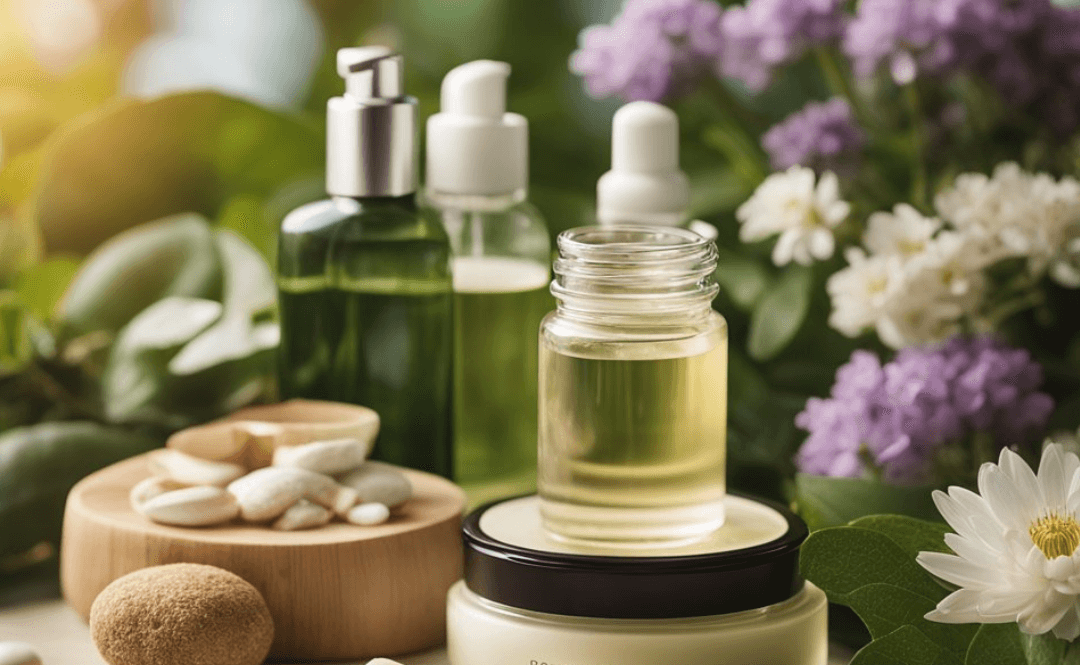Natural skin care has become increasingly popular in recent years, as more people are becoming aware of the harmful chemicals present in traditional personal care products. DIY natural skincare is a great way to take control of the ingredients you put on your skin, and to customize your skincare routine to meet your specific needs. With a little research and experimentation, you can create effective and non-toxic skincare products right in your own home.
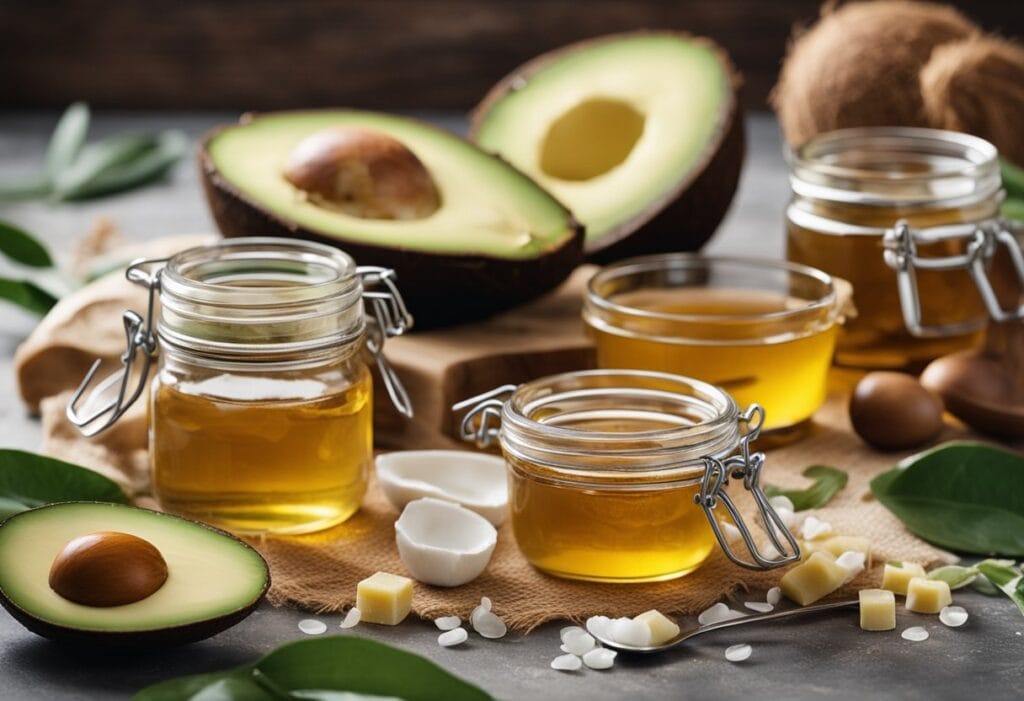
Understanding your skin type is key to creating a successful DIY natural skincare routine. Different skin types require different ingredients and treatments, so it’s important to know your skin type before you start. Once you know your skin type, you can choose the right ingredients and recipes to address your specific skincare concerns. Whether you have dry, oily, sensitive, or combination skin, there are natural ingredients and recipes that can help.
Essential natural ingredients for DIY skincare include things like coconut oil, shea butter, aloe vera, and essential oils. These ingredients are nourishing and moisturizing for the skin, and can be used in a variety of recipes. From facial cleansers to body scrubs to face masks, there are endless possibilities for creating your own natural skincare products at home.
Key Takeaways
- Understanding your skin type is key to creating a successful DIY natural skincare routine.
- Essential natural ingredients for DIY skincare include things like coconut oil, shea butter, aloe vera, and essential oils.
- With a little research and experimentation, you can create effective and non-toxic skincare products right in your own home.
Understanding Your Skin Type
When it comes to DIY natural skincare, understanding your skin type is crucial. Knowing your skin type allows you to identify the best ingredients and products that will work best for you. There are five basic skin types: oily, dry, sensitive, combination, and normal.
Identifying Skin Concerns
Identifying your skin concerns is the first step in understanding your skin type. Oily skin tends to have an excess of oil production, which can lead to clogged pores and acne breakouts. Dry skin, on the other hand, lacks moisture and can be flaky and itchy. Sensitive skin is easily irritated by certain ingredients, and can be prone to redness and inflammation. Combination skin is a mix of oily and dry skin, with some areas being more oily than others. Normal skin is well-balanced, with no excess oil or dryness.
The Role of Genetics in Skin Health
Genetics plays a role in determining your skin type, but it’s not the only factor. Lifestyle choices such as diet, stress levels, and skincare habits also contribute to the health of your skin. For example, a diet high in sugar and processed foods can lead to inflammation and breakouts, while stress can cause skin to become dull and tired-looking.
In order to maintain healthy skin, it’s important to identify your skin type and concerns, and choose products and ingredients that cater to your specific needs. With a little bit of knowledge and experimentation, you can create a DIY natural skincare routine that works best for you.
Essential Natural Ingredients
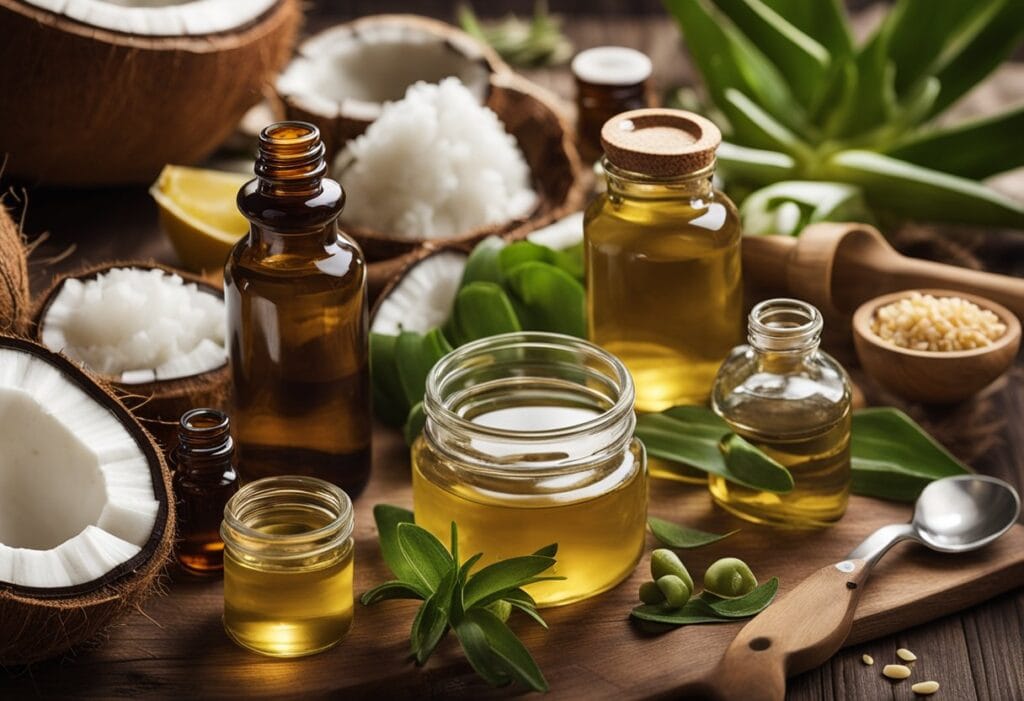
When it comes to DIY natural skin care, it’s important to know the key ingredients that can help nourish and protect your skin. Here are some of the essential natural ingredients that we recommend:
Carrier Oils and Their Benefits
Carrier oils are vegetable oils that can be used to dilute essential oils and help them absorb into the skin. Some popular carrier oils include:
- Coconut oil: Rich in fatty acids, coconut oil is deeply moisturizing and can help improve skin elasticity.
- Olive oil: High in antioxidants, olive oil can help protect the skin from damage caused by free radicals.
- Jojoba oil: Similar in composition to the natural oils produced by our skin, jojoba oil is easily absorbed and can help balance oil production.
- Almond oil: Rich in vitamins and minerals, almond oil can help soothe and nourish dry, irritated skin.
The Power of Essential Oils
Essential oils are highly concentrated plant extracts that can provide a wide range of benefits for the skin. Some popular essential oils for skin care include:
- Lavender oil: Known for its calming and soothing properties, lavender oil can help reduce inflammation and promote healing.
- Tea tree oil: With its powerful antibacterial properties, tea tree oil can help fight acne and other skin infections.
- Frankincense oil: Renowned for its anti-aging benefits, frankincense oil can help reduce the appearance of fine lines and wrinkles.
- Peppermint oil: With its cooling and refreshing properties, peppermint oil can help invigorate tired, dull skin.
Butters and Waxes for Skin Protection
Butters and waxes can help protect the skin from moisture loss and environmental damage. Some popular options include:
- Shea butter: Rich in vitamins and fatty acids, shea butter can help nourish and moisturize dry, damaged skin.
- Cocoa butter: With its high concentration of antioxidants, cocoa butter can help protect the skin from free radical damage.
- Beeswax: A natural emollient, beeswax can help lock in moisture and protect the skin from environmental stressors.
By incorporating these essential natural ingredients into your DIY skin care routine, you can help keep your skin looking and feeling healthy and radiant.
DIY Skincare Recipes
Taking care of your skin is essential for maintaining a healthy and youthful appearance. However, many commercial skincare products contain harsh chemicals that can be harmful to your skin and the environment. That’s why we recommend trying out DIY skincare recipes. Not only are they natural and eco-friendly, but they are also affordable and customizable to your skin’s needs.
Homemade Facial Cleansers
Facial cleansers are an essential part of any skincare routine as they help remove dirt, oil, and makeup from your skin. Here are a few DIY facial cleanser recipes that you can try:
- Oil Cleanser: Mix one part castor oil with two parts olive oil or sunflower oil. Massage onto your face for a few minutes and then wipe off with a warm washcloth. This cleanser is great for removing makeup and unclogging pores.
- Honey Cleanser: Mix one tablespoon of honey with a few drops of lavender essential oil. Massage onto your face and then rinse off with warm water. This cleanser is great for soothing and hydrating dry skin.
Natural Exfoliating Scrubs
Exfoliating your skin helps remove dead skin cells and promotes cell turnover, leaving your skin looking brighter and smoother. Here are a few DIY exfoliating scrub recipes that you can try:
- Coffee Scrub: Mix one tablespoon of coffee grounds with one tablespoon of coconut oil. Massage onto your skin in circular motions and then rinse off with warm water. This scrub is great for reducing the appearance of cellulite and improving circulation.
- Sugar Scrub: Mix one cup of sugar with half a cup of coconut oil and a few drops of your favorite essential oil. Massage onto your skin in circular motions and then rinse off with warm water. This scrub is great for exfoliating and moisturizing dry skin.
Moisturizing Creams and Lotions
Moisturizing your skin is essential for keeping it hydrated and healthy. Here are a few DIY moisturizer recipes that you can try:
- Lotion Bars: Melt one cup of beeswax, one cup of coconut oil, and one cup of shea butter in a double boiler. Pour into silicone molds and let cool. These lotion bars are great for moisturizing dry skin and can be used on your face and body.
- Whipped Body Butter: Melt one cup of shea butter and one cup of coconut oil in a double boiler. Let cool and then whip with a hand mixer until light and fluffy. Add a few drops of your favorite essential oil and then transfer to a jar. This body butter is great for moisturizing and soothing dry skin.
In conclusion, DIY skincare recipes are a great way to take care of your skin naturally and affordably. By using natural ingredients, you can avoid harmful chemicals and customize your skincare routine to your skin’s needs. Give these recipes a try and see the difference they can make for your skin!
Specialized Skin Care Treatments
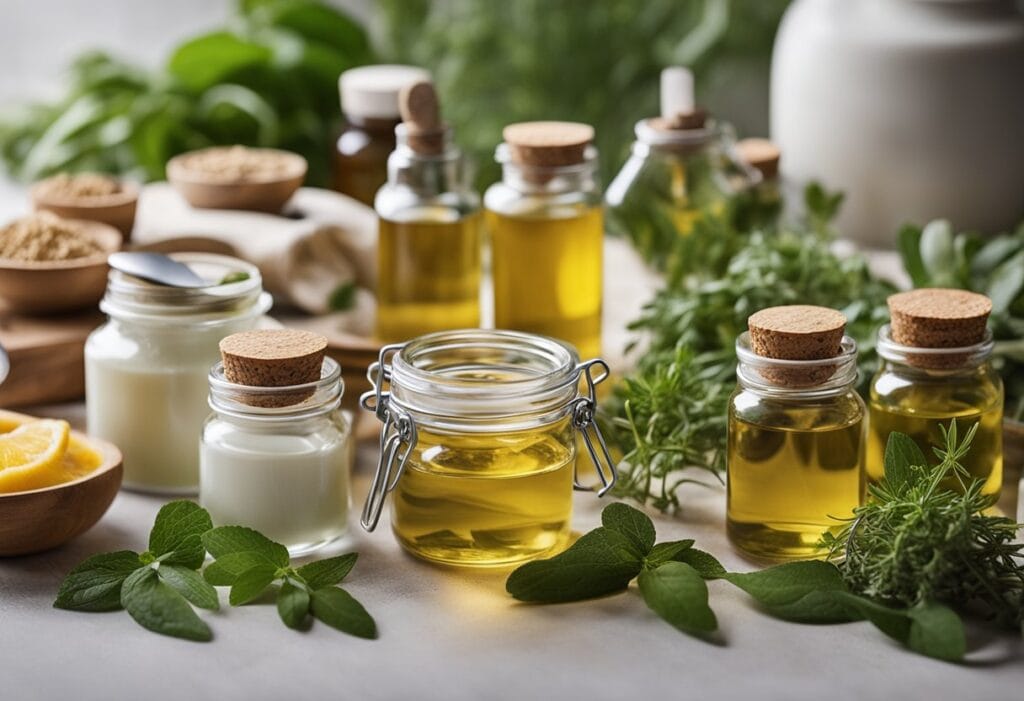
When it comes to skin care, we all have different needs and concerns. That’s why there are specialized treatments that can address specific issues. Here are a few DIY natural skin care treatments that can help soothe and heal your skin.
Soothing Masks and Toners
Facial masks and toners can be a great way to calm irritated skin and reduce redness. One of our favorite DIY toners is made with green tea and apple cider vinegar. Steep a bag of green tea in boiling water for a few minutes, then let it cool. Mix the tea with equal parts apple cider vinegar and water, then apply to your face with a cotton ball. This toner is great for reducing inflammation and fighting acne.
For a soothing mask, try mixing 1 tablespoon of honey with 1 tablespoon of plain yogurt. Apply the mixture to your face and leave on for 15-20 minutes before rinsing off with warm water. This mask is great for hydrating and calming your skin.
DIY Remedies for Common Skin Issues
If you struggle with blemishes or blackheads, try using a facial serum that contains tea tree oil. Tea tree oil has natural antibacterial properties that can help fight acne-causing bacteria. Mix a few drops of tea tree oil with a carrier oil like jojoba oil or argan oil, then apply to your face before bed.
For an eye cream that can help reduce puffiness and dark circles, try mixing 1 tablespoon of aloe vera gel with 1 teaspoon of vitamin E oil. Apply the mixture gently around your eyes before bed.
To keep your lips soft and hydrated, try making your own lip balm with coconut oil and beeswax. Melt 1 tablespoon of beeswax in a double boiler, then add 2 tablespoons of coconut oil. Stir until melted, then pour into a small container and let cool.
These are just a few examples of the many DIY natural skin care treatments that you can try at home. With a little experimentation, you can find the perfect combination of ingredients that works for your skin.
Safe DIY Skincare Practices
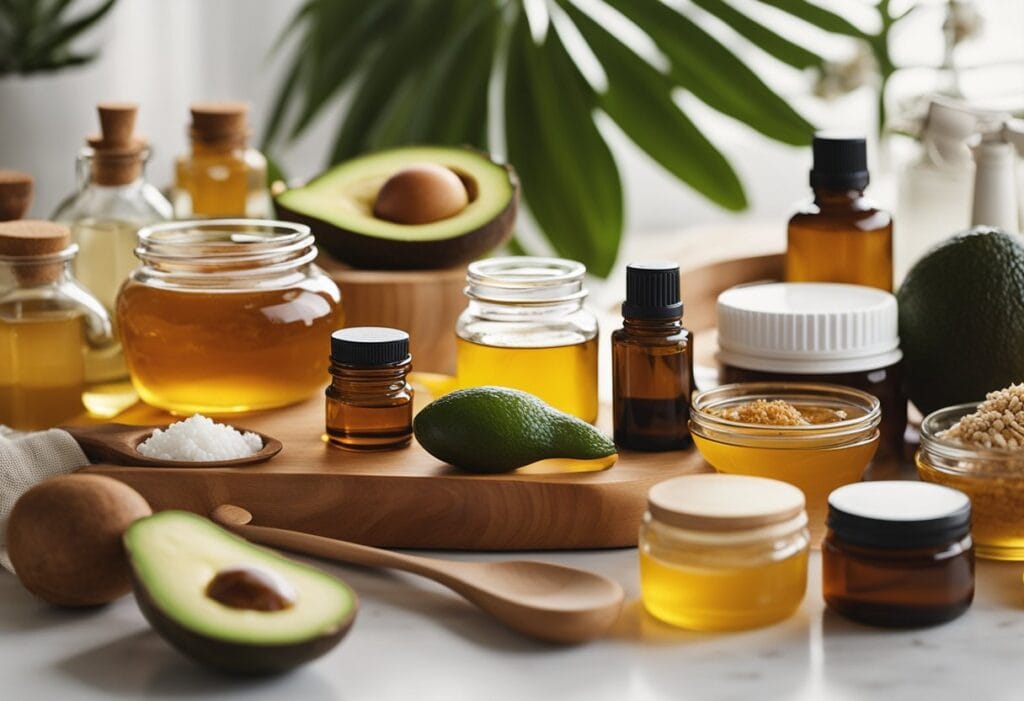
When it comes to DIY skincare, it’s important to be mindful of the ingredients we use and the potential risks involved. While natural ingredients are generally safe, it’s still important to understand the basics of skincare formulation to ensure that our homemade products are effective and safe to use. Here are some key practices to keep in mind:
Understanding Preservatives and Shelf Life
One of the biggest challenges of DIY skincare is ensuring that our products remain safe and effective over time. Unlike commercial products, which often contain synthetic preservatives to extend their shelf life, homemade products are more susceptible to bacterial growth and contamination. As a result, it’s important to use natural preservatives to help extend the shelf life of our products.
Some common natural preservatives include vitamin E, grapefruit seed extract, and essential oils like tea tree and lavender. However, it’s important to note that not all natural preservatives are effective against all types of bacteria and fungi. It’s also important to store homemade products in a cool, dry place and to use them within a reasonable timeframe to ensure their effectiveness.
Navigating DIY Skincare Responsibly
When it comes to DIY skincare, it’s important to be mindful of the ingredients we use and the potential risks involved. While natural ingredients are generally safe, some ingredients can be harsh or even toxic when used in high concentrations or on sensitive skin. It’s also important to be aware of questionable ingredients and to avoid using them in our skincare formulations.
To help navigate the world of DIY skincare responsibly, it’s important to do our research and to consult reliable sources like the Environmental Working Group’s Skin Deep database. This database provides information on the safety of various skincare ingredients, as well as recommendations for safer alternatives.
When formulating our own skincare products, it’s also important to use proper emulsifiers and essential fatty acids to ensure that our products are effective and well-balanced. Some common emulsifiers include beeswax, lecithin, and cetyl alcohol, while essential fatty acids like omega-3 and omega-6 oils can help nourish and protect the skin.
By following these safe DIY skincare practices, we can create effective, natural skincare products that are both safe and enjoyable to use.

